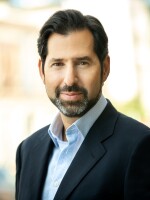Former New York Times reporter Judith Miller on Tuesday bolstered the prosecution of a former top aide to Vice President Dick Cheney. Miller testified in federal court in Washington, D.C., that Lewis "Scooter" Libby had told her of the identity of a CIA agent more than two weeks before it became public in July 2003.
Libby resigned as Cheney's chief of staff after his indictment in October 2005. He is on trial for perjury and obstruction of justice for denying that he had been involved in leaking the fact that a prominent critic of the Bush administration – former Ambassador Joseph Wilson – was married to a CIA agent. Under some circumstances, the disclosure of an undercover agent's identity can be a federal crime, though that specific offense was never alleged in this case.
Libby told investigators that he believed that he had learned of former CIA agent Valerie Plame Wilson's existence from other reporters – just before syndicated columnist Robert Novak cited her in print on July 14, 2003.
But Miller testified under oath Tuesday that Libby told her about Valerie Plame Wilson's connection to former Ambassador Wilson on June 23, 2003. Libby seemed agitated, she said, that news outlets reported Vice President Cheney had sent Wilson on a fact-finding mission to Niger, to determine whether Iraqi officials had attempted to obtain nuclear materials there.
Bush administration officials declared that Saddam Hussein sought to do just that. But Wilson concluded otherwise.
Libby told Miller that the CIA had embarked on a "perverted war of leaks" to distance itself from the case made by the White House for invading Iraq in 2003, given the lack of evidence of weapons for mass destruction there. According to Miller, Libby brought up Wilson's wife as he insisted that the CIA, not Cheney, had sent Wilson on the trip.
"He said that his wife – referring to Wilson – worked in the bureau," Miller recalled. "In the beginning, my understanding of the bureau meant the FBI... In the context of the conversation, it became quickly clear he was referring to the CIA."
Miller, a Pulitzer Prize winner, testified very reluctantly. She spent 85 days in a Virginia jail back in 2005, after failing to get federal judges to quash a subpoena from Special Prosecutor Patrick Fitzgerald. She agreed to testify only after Libby sent her a letter releasing her from the promise to protect him as an anonymous source.
Miller's role in the leak case led to her forced departure from the Times. Editors there claimed she had not been forthcoming about her conversations with Libby and other sources in the case.
Miller spoke with Libby three times about former Ambassador Wilson, his charges against the administration, and Valerie Plame Wilson. But when Miller first testified to the grand jury, she did not reveal her June 23 meeting with Libby – and had to return to the grand jury to do so.
Libby's defense lawyer, William Jeffress, questioned Miller tartly about her memory, repeatedly seeking to undermine her credibility as a witness.
"Do you have a good memory?" Jeffress asked.
"About some things," Miller replied.
She said she recalled the June 23rd meeting only after re-reading her notes. Jeffress later asked whether she could even recall the question he had just asked her.
In addition, Jeffress' questioning appeared to dovetail with the argument that Libby's memories of his own behavior may have been shaky – but innocently so.
Earlier in the day, former Cheney legal counsel David Addington testified that Libby had denied having anything to do with the leak back in September 2003. Addington testified that Libby told him at a meeting in the Old Executive Office Building, "I just want you to know, I didn't do it."
Addington replaced Libby as Cheney's chief of staff after Libby was indicted and resigned. Addington testified that during the September 2003 meeting, Libby asked how someone would know whether a CIA agent were undercover. That's a key element to the statute that led to Fitzgerald's investigation. Addington testified that he replied, "You'd only know if they told you."
Libby's lawyers also repeatedly pushed the idea that the Bush White House had decided to sacrifice Libby in order to save Karl Rove, a key presidential adviser. Then-White House spokesman Scott McClellan first told reporters in mid-September 2003 that Rove had nothing to do with the leak – though later it was shown that Rove had been involved.
Libby pressured Cheney to demand that he be defended, too. In a memo released Tuesday, Cheney expresses anger over the White House's failure to protect Libby:
His note said: "Has to happen today. Call out to key press. Say same thing about Scooter as Karl. Not going to protect one staffer and sacrifice the guy that was asked to stick his neck in the meat grinder because of the incompetence of others."
Several weeks passed before McClellan made claims defending Libby's innocence in the leak case.
Addington testified that he asked Dan Bartlett, a senior White House communications aide, why the press office had said anything publicly about a criminal investigation.
"I've been in government 30 years, and I know there are three things a press office shouldn't do," Addington said. The first two are comment on intelligence matters or troop movements, he said, adding: "The third thing you don't talk about is a criminal investigation, because frankly, you don't know, and you haven't done an investigation."
Addington testified that Bartlett's answer threw him for a loop: "His reaction was, 'Your boss was the one who wanted it.' And then I shut up."
Copyright 2022 NPR. To see more, visit https://www.npr.org. 9(MDAzMjM2NDYzMDEyMzc1Njk5NjAxNzY3OQ001))






